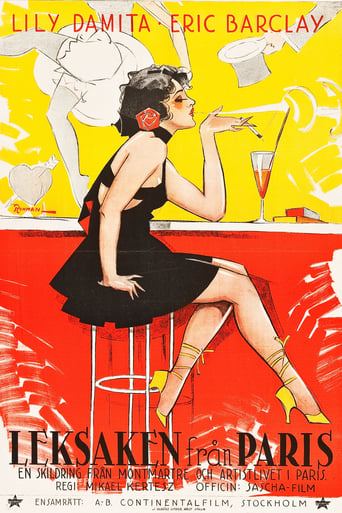kekseksa
Miháli Kertész was in many ways the Austrian Cecil B DeMille and the same delight in whimsy and spectacle softens the edges of his films so that they never have an real bite. But, just like DeMille, he is a fine director who could have made much better films. The scenes towards the end of this film in Brittany, when the relationship between the earnest young diplomat (he is anything but a playboy) and his actress-wife is deteriorating, are superbly done. These scenes actually have much in common with the similar scenes between Belmondo and Anna Karina in Godard's Pierrot le Fou - Q'est-ce qu'il faut faire, il n'y a rien à faire - and may in both cases owe something to the fact that the actress was also (precariously) married to the director. So although, as the German count quite rightly points out, the basic story of the film is an absolute cliché of silent era films, these scenes stand out as something quite startlingly different that probes deeper than melodrama.The ending of the film which appears for a moment to be almost obscenely conventional is actually quite a neat double-take.It is unsurprising that Kertész was one of the exiles who found the move to the US and Hollywood relatively unproblematic. As an Austro-Hungarian, he had always kept his distance from the German film industry and absorbed little of its ethos, his influences always being more Hollywoodian. He lacked DeMille's passion for control (and there was in any case no room for a second DeMille in the US) and remained to the end of his career a totally pragmatic film-maker, fairly indifferent to what films he made and little troubled by the studio system. That he should strike lucky with the rather kitschy romantic classic Casablanca was entirely in the logic of things....but there was something else there (one can see it in the following year's Fiaker Nr. 13 as well) that got lost along the way.A curious feature of the film is that the actor playing the Vicomte, who is so crucial to the film, would seem to have appeared if IMDb is to be believed,in no other films.
FerdinandVonGalitzien
After being an unknown singer in a Montmartre night club, Frau Célimène ( Frau Lili Damita ) is discovered by the Viscount de Maudry ( Herr Georges Tréville ) and the beautiful music-hall dancer becomes the new Paris sensation at the noble establishment " Nouvel Eden ". She is drawn to the Viscount who is an old man but who is, after all, the one responsible for discovering her. However, she also has another suitor in the good-looking young diplomat, Herr Miles Seward ( Herr Eric Barclay ), although he is already engaged to a bourgeoisie fräulein. Célimène flirts with both men constantly but finally makes up her mind, leaving her successful artistic career behind and going with the diplomat to Brittany to a lonely fishing village, a drastic and boring change for Célimène who very soon will yearn for her former fame and the lights of Paris.Herr Miháli Kertész was a Hungarian film director who became very well-known in the talkie film world as Herr Michael Curtiz, an irrelevant fact for this German count who prefers to talk about older and silent times but such information will keep the longhaired new generation interested and educate them about those important directors who had a silent past. Herr Kertész worked in Hungary, Austria and Germany before going to America. "Das Spielzeug von Paris" (1925) is a film that belongs to his Austrian period.In the film can be seen and appreciated a careful concern for detail and the remarkable art direction that was a trademark during Herr Kertész silent period. This is obvious in every scene of the film, from the Montmartre den of iniquity to the splendorous "Nouvel Eden" theatre, a crowded place where "le Tout Paris" is enjoying spectacular revues. And we must not forget the lavish mansions and luxurious wardrobe, especially Frau Célimène's fashionable outfits. All these elements give the film the air of decadence necessary for a story about a mad and impossible love, an "amour fou" as a Frenchman said.This sentimental "ménage à trois" in the film is further complicated by the other characters: Herr Seward's fiancée, his sister and mother-in-law and Herr Viscount de Maudry's mistress. The core of the story of course is the tormented relationship between Célimène and Miles, and though this is a familiar situation and a "classic silent one" this tale of doomed love builds in intensity and works perfectly in artistic and dramatic terms. However, at the end of the film, Herr Kertész puts forth a realistic and bitter conclusion: Célimène and Miles accept and realize the fact that their love is impossible and they must bow to the conventional and hypocritical unwritten rules of the society and circle they are part of.Dame Lili Damita is the star of the film, wearing spectacular and lavish Parisian costumes throughout, except in Brittany obviously. She dances and allows herself be adored by her admirers, a classic silent diva but the exaggeration doesn't matter because "Das Spielzeug von Paris" is overall a fantasy, a big show ( complete with musical numbers ). By Austrian film production standards, it's sumptuous as well as being decadent even though it has the atmosphere of a modern operetta and is less bold and cynical that one would like.And now, if you'll allow me, I must temporarily take my leave because this German Count has an appointment with a "Nouvel Eden" chorus girl.



